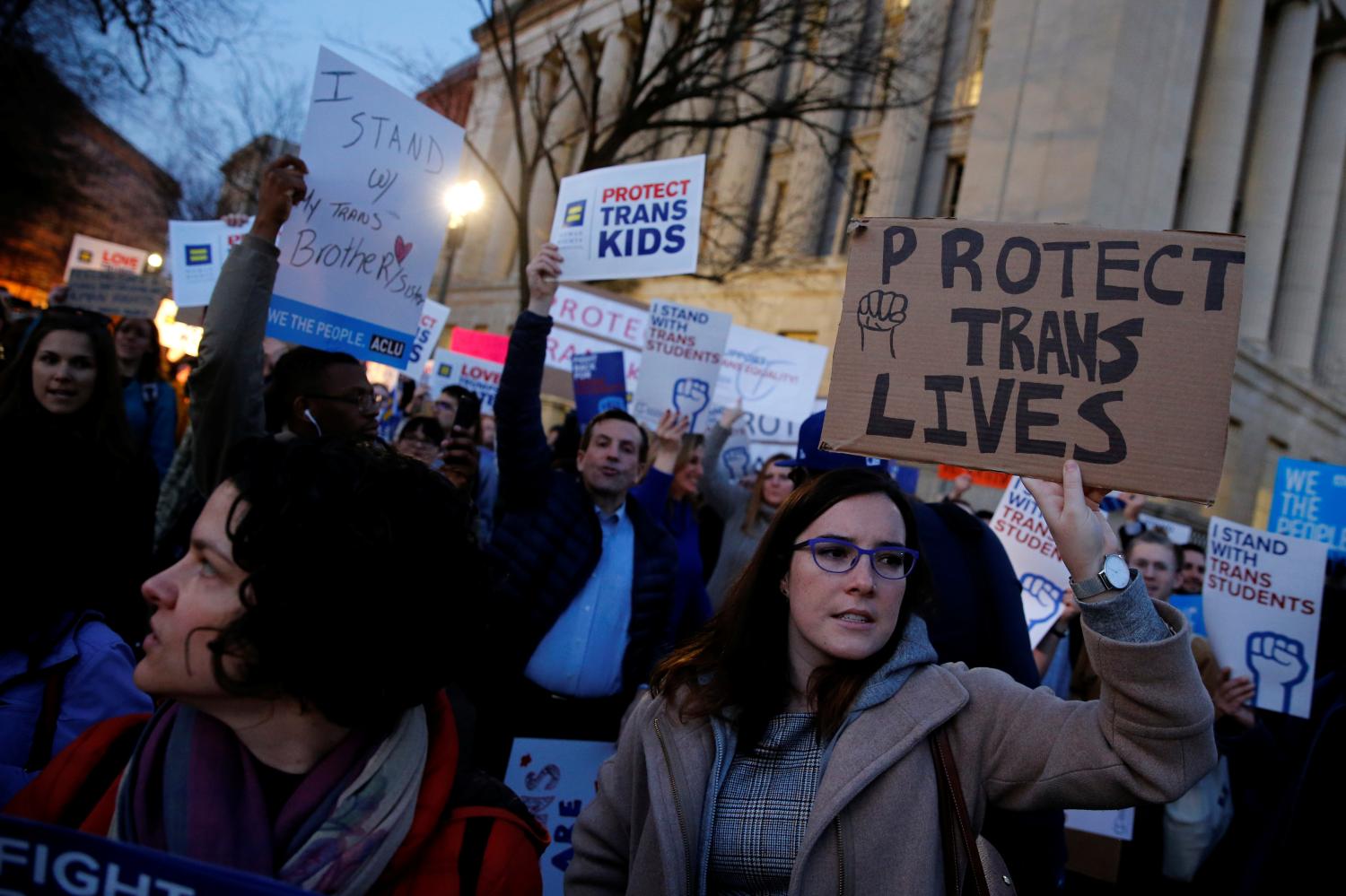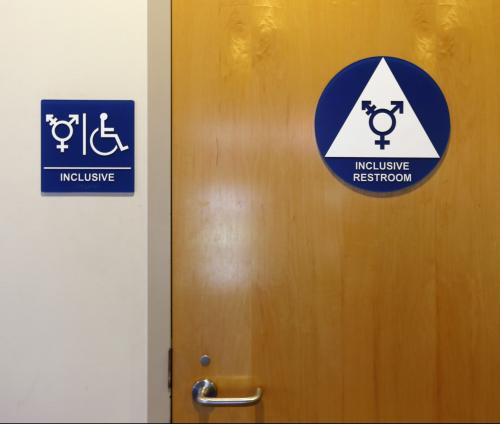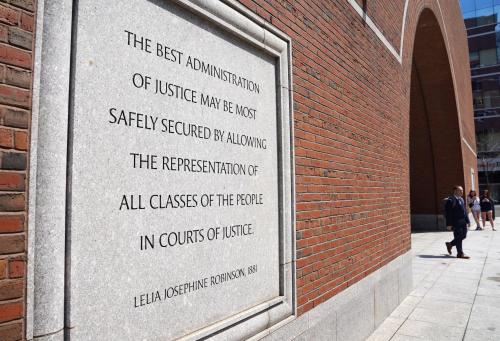In recent years, the rights and experiences of LGBTQ people have been a growing subject of national news media coverage, scholarly research, case law, and policymaking. Within the educational context, the attention has been significant. Thus, it is an important time to examine the legal landscape of this topic, which demonstrates a trend in litigation that recognizes the rights of transgender and gender-expansive students.
During the Obama administration, the U.S. departments of Education and Justice released guidance in 2016 clarifying that transgender students are protected under Title IX. The Trump administration rescinded that guidance in February 2017. In that same year, a federal court of appeals judge wrote a moving concurring opinion in a case involving a transgender student (Gavin Grimm or G.G.). At the time, this case was impacted by the Trump administration’s decision to rescind the 2016 guidance. The judge who examined this case stated:
“[S]ome entities will not protect the rights of others unless compelled to do so. Today, hatred, intolerance, and discrimination persist—and are sometimes even promoted—but by challenging unjust policies rooted in invidious discrimination, G.G. takes his place among other modern-day human rights leaders who strive to ensure that, one day, equality will prevail, and that the core dignity of every one of our brothers and sisters is respected by lawmakers and others who wield power over their lives.”
Three years later, equality indeed prevailed in G.G.’s case. Specifically, according to the Fourth Circuit Court of Appeals:
“The proudest moments of the federal judiciary are when we affirm the burgeoning values of our bright youth, rather than preserve the prejudices of the past. … How shallow a promise of equal protection that would not protect Grimm from the fantastical fears and unfounded prejudices of his adult community. It is time to move forward.”
Grimm’s case, which is currently being appealed, illustrates one of the many facets of the national LGBTQ legal landscape, a landscape that is both complex and evolving. There have been several other recent legal challenges addressing transgender students’ rights in public schools.
The lawsuits span a variety of issues, from restrooms to pronoun preference to athletics. This recent litigation is not entirely surprising as studies suggest that transgender and gender-expansive students often experience discrimination in schools. Before presenting the case law, it is worth noting that throughout this article, we use the word transgender because this is the language often used by the courts. However, the issues before the court may apply to students who identify as gender fluid, gender nonbinary, genderqueer, or gender expansive.
The Legal landscape
Restrooms
In August 2020, the 11th Circuit (Alabama, Florida, Georgia) affirmed a federal district court’s opinion, finding the school’s policy prohibiting a transgender male student from using the boys’ restroom as a violation of the 14th Amendment’s Equal Protection Clause and Title IX. The court held that the policy was administered in an arbitrary way and that it lacked any factual support. Also, in August 2020, after five years of litigation, the Fourth Circuit (Maryland, North Carolina, South Carolina, Virginia, West Virginia) issued its decision in Gavin Grimm’s case, finding both a violation of the Equal Protection Clause and Title IX when Gavin was prohibited from using the boys’ restroom.
These recent cases are consistent with our earlier research, which reported that every court across the nation that has examined these K-12 restroom access cases (n=10) has ended in a favorable result for transgender students. As the Seventh Circuit observed, “A policy that required an individual to use a bathroom that does not conform with his or her gender identity punishes that individual for his or her gender non-conformance, which in turn violates Title IX.”
In addition to these 10 access-related cases, our earlier work reported that there have also been at least three challenges initiated by cisgender plaintiffs who claimed that their constitutional right to privacy was violated when they shared a restroom with a transgender student at school. This litigation did not end in a favorable result for the cisgender students. In all four cases, the courts declined to recognize such an expansive constitutional right to privacy.
Preferred pronouns
Although courts have only begun to address this issue, one 2020 federal court decision provides some helpful guidance on the matter. This lawsuit involved a public schoolteacher who refused to address transgender students by their preferred names and pronouns in class because of his religious beliefs. The school district adopted a policy allowing transgender and gender-expansive students to use the restroom of their choice and to change their names in the school database. Teachers were asked to use the names listed in the student database, but one teacher refused to do so. This teacher worked out a plan with school officials to refer to all students by their last names in order to avoid using students’ preferred names. This plan was eventually dropped because it created tension in the school. The teacher refused to comply and was asked to resign. He sued the school district.
In dismissing the teacher’s free exercise claim (one of 13 claims), the federal district court found that the school district’s policy was neutral and generally applicable to every teacher, regardless of religious belief. Furthermore, there was no evidence that this policy was developed to target any specific religious belief. There is at least one other lawsuit that has been filed with similar claims that is still ongoing.
Athletic participation
Similar to pronoun preference, transgender student participation in athletics is starting to attract more attention, but there has not yet been a lot of litigation in this area. In one recent lawsuit, plaintiffs challenged an Idaho law that barred the participation of transgender women and girls in female student athletics. The law would have prohibited participation on female teams without verifying the “reproductive anatomy” if it was called into question. In their lawsuit, the plaintiffs sought a preliminary injunction to enjoin enforcement of the law. The court granted the plaintiffs’ preliminary injunction. South Dakota, Tennessee, and Connecticut have been involved in other controversies involving transgender students and athletics. These matters remain ongoing. The Education Department’s Office for Civil Rights recently released a “revised letter of impending action” related to the topic.
Looking ahead
In the preceding section, we have described some narrow legal matters impacting LGBTQ students, but there are other emerging concerns that relate to this topic. Below, we have included an illustrative but non-exhaustive list of ongoing issues to follow:
- Title IX. In July 2020, the U.S. Supreme Court determined in Bostock v. Clayton County that Title VII’s prohibition on sex-based discrimination provides protection against discrimination on the basis of sexual orientation and gender identity within the employment context. Courts, like the federal appeals court that decided Gavin Grimm’s case, will have to determine how this decision impacts analysis of Title IX’s similar protections from sex-based discrimination. Although Title VII covers employment, courts examining Title IX issues often look to Title VII for guidance. For example, the Fourth Circuit observed, “After the Supreme Court’s recent decision in Bostock v. Clayton County, … we have little difficulty holding that a bathroom policy precluding Grimm from using the boys’ restrooms discriminated against him ‘on the basis of sex.’”
- U.S. Supreme Court. With the recent passing of Justice Ruth Bader Ginsburg, President Trump has already nominated Amy Coney Barrett to fill her seat on the court. Mark Walsh’s recent Education Week article observed that, four years ago, Barrett said that she was skeptical about Title IX providing protections for transgender students. Of course, these comments were made before the Bostock decision and before all lower courts had ruled in favor of transgender K-12 students. Regardless of whether the Supreme Court appointment occurs before or after the election, it is likely that the new justice will have an impact on future LGBTQ litigation.
- Private schools. Although private schools were beyond the scope of this post, media sources and researchers report that many private, religious schools openly discriminate against LGBTQ students. Several of these schools receive public money through voucher programs. The Supreme Court ruled in 1983 that private schools could lose their tax-exempt status if they discriminate against students based on race. Similarly, courts will also likely determine if private schools that accept public money can discriminate against LGBTQ students. There has been a recent legal challenge to North Carolina’s voucher program that addresses this issue.
- Charter schools. An LGBTQ-affirming charter school, Magic City Acceptance Academy, was recently denied a charter in Alabama. This was not the first time that this school was denied a charter. Meeting minutes from the Alabama Public Charter School Commission provide some explanation of why the charter was denied – and show applicants’ concern about potential bias. If private schools that accept public money are allowed to exclude LGBTQ students, it will be interesting to observe whether charter schools might be able to seek to provide a safe haven for them.
As highlighted above, the outcomes of the court cases have ended in a favorable result for K-12 transgender students. Even though the U.S. Supreme Court has not addressed the matter, these issues present emerging legal concerns that will be important to watch. In addition to litigation, research will continue to increase our comprehension of this important policy topic. For example, current research demonstrates that policies excluding transgender and gender-expansive youth in schools have a detrimental impact on their overall well-being, whereas inclusive school policies increase student engagement and improve academic, emotional, and psychological well-being. These studies will assist school leaders in understanding the need to create a school climate that is accepting of all students.
The Brookings Institution is committed to quality, independence, and impact.
We are supported by a diverse array of funders. In line with our values and policies, each Brookings publication represents the sole views of its author(s).







